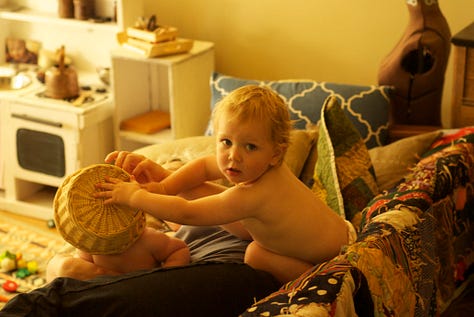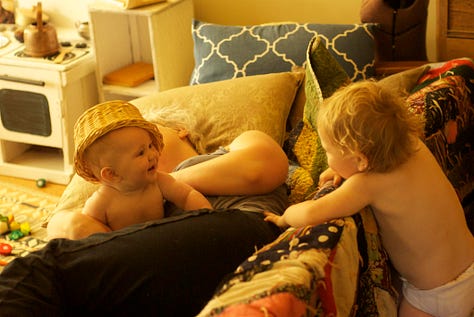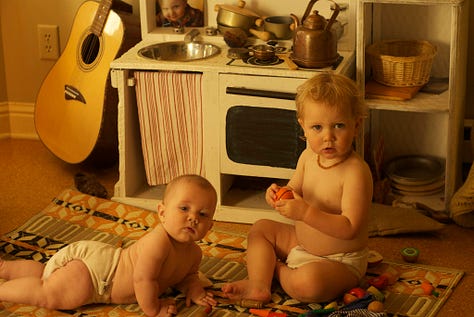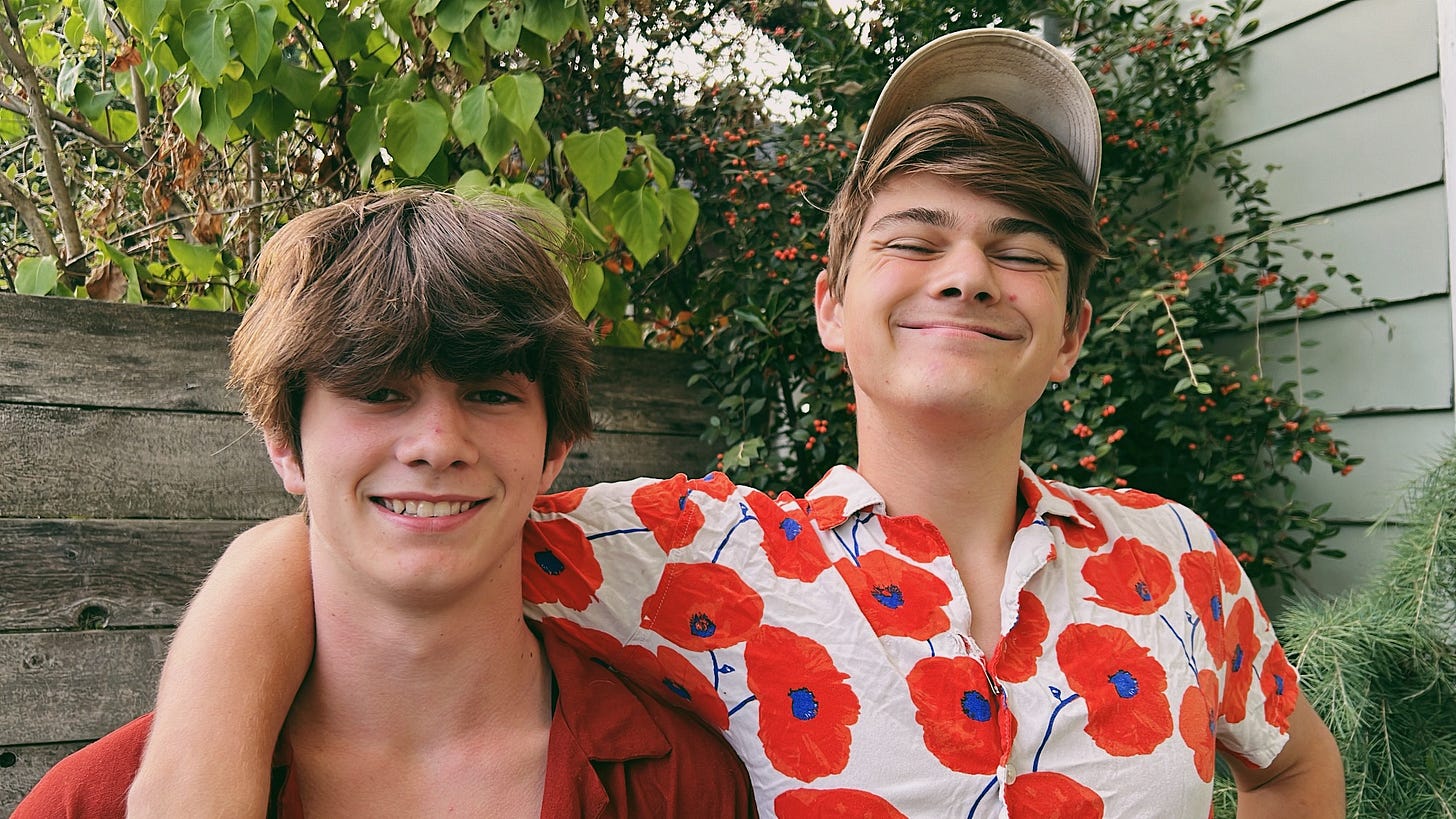#11 What I Thought 16 Would Be Like (and What It Is)
It is infinitely better than I imagined. Also: an art quilt, when everything you say is negated 🫠, and we have to stop hoarding opportunities for our children.
⭕️ Etik Collection These gorgeous, one-of-a-kind hand-stitched quilts by Tessa Layzelle remind me of Hilma af Klint.1
⭕️ Men Responding Negatively to Everything a Woman Says “It’s socialized resistance to women speaking…The problem is, constantly putting up with unwarranted resistance is bad for mental health.” A thread by Toph Cassandra Beifong (and more here).2
⭕️ We Can’t Let Family Life Become a Political Pawn. “Family self-reliance is a story line that has led us down a bleak path. There is an urgent need for us to think of our families, and act on behalf of them, in opposition to this story.” Everything in this newsletter from Kathryn Jezer-Morton.3
⭕️ Martha A buzzy documentary on Netflix about the original queen of lifestyle, Martha Stewart. Love her, hate her, her rise and fall and second rising make a great story!4



Another One! Above is a recording of a conversation I had with Sebastian and our kids, Pan and Orion, about their thoughts on healthy masculinity, childhood, and the future. A shorter listen than last week’s!
Some Thoughts on Parenting Through the Teen Years
My son, Pan, will be 16 tomorrow.
What I remember of being 16 is mostly frustration, often rage, and an intensely adversarial relationship with my parents. There were moments of truce, when what we wanted of each other aligned, but those moments were rare. I remember long stretches of silence, when refusing to speak to them felt like the only tool of protest I had, and screaming, too, when I insisted on being heard, even if I wasn’t understood.
On paper, I was a really good kid. I got top grades, was involved in school and in our community, went to mass every Sunday, tried to be kind and thoughtful to everyone I encountered, had a steady weekend job (and paid for many of my own things), helped care for my six younger siblings, had a sweet collection of friends who were similarly involved and ambitious. I never drank or partied or snuck out of the house. My friends and I went out for dinner at Applebees on Friday nights, maybe caught a movie or hung out in someone’s basement being silly. We were theater kids; we knew how to be wild and silly without influence.
What do I mean by wild? My friend Joanna and I had a tradition of getting KFC to-go and renting a movie at Blockbuster that neither of us had heard of before.
And yet I felt that my parents always assumed the worst of me, that my achievements meant nothing to their view of my character, that no matter what I did, I was somehow not doing enough. There was little trust in our relationship. No was easier than yes. If I was given an inch of freedom, surely I would make the wrong decisions with it. I wasn’t allowed to have sleepovers. I had a 10pm curfew the summer before I went away to college in Chicago.
I find myself bracing, now, for some sort of loud pushback or resentment from my own teenagers. It would be normal for them to perhaps overshoot in differentiating themselves from us. Where is the anger, the obnoxiousness? Don’t I deserve the same treatment from my kids that I furiously projected at my parents?
I suppose it could still be coming; we have a few more years yet to go.
But I’m not sure it is?
Adversarial relationships between teenagers and their parents are so normalized in our current culture. We see them play out in television, magazines, YA novels, film. Parents are stereotyped as clueless, out of touch, ingratiating, demanding, overly ambitious, hovering, pathetic, unaware of their own trauma or emotional baggage. Teens are entitled, immature, selfish, bratty, condescending, self-absorbed, clueless, woke.
These personalities can hardly share space without condemning and rejecting each other. How could they possible share a healthy relationship?
Another dynamic that has become normalized in the past decade or so is the “bestie” relationship, typically between mothers and daughters. I’m not sure this is healthy, either.
I’ve cultivated closeness with my children that I hope will continue to deepen and broaden as they become adults, but I play a very specific role in their lives. I’m one of very few people who can play this role for them, and that role should not be confused with friendship.
One of my kids recently rewatched all three seasons of Ted Lasso, and I sat to watch a few episodes with him. In one, Coach Beard rekindles a relationship with Jane — and it’s wildly toxic. But none of Coach Beard’s friends will talk to him about how unhealthy, controlling, and manipulative this relationship dynamic is — because you should never, ever tell a friend what you really think about their partner. It leads to no good.
But a parent has a different responsibility than a friend. All feedback and advice should be approached with care, but it doesn’t have to ruin the relationship (the way it might ruin a friendship). This kind and honest guidance needs to come from somewhere; I think it must come from a parent.
We’re here as parents to provide instruction and guidance, to demonstrate how things work. It’s not exactly fun, but I’ve discovered it doesn’t have to be miserable.
And I’ve learned so much from them.
I’ve observed a beautiful equanimity in Pan, who will be 16 tomorrow. He approaches his work with a calm matter-of-factness: it’s simply what he’s doing now. He may open his laptop to work on homework on a Friday night, he happily attends school meetings on a Sunday or Wednesday evening, he doesn’t need to be reminded to study or work ahead on projects. It doesn’t all have to be a struggle, charged, a fatiguing uphill climb. What a revelation!
I watch him and I think, what would it be like to live without the constant presence of resistance — internal or external? Because I find I’m always braced for someone to tell me no, I can’t. Always poised to be negated. And I’m always ready to debate, with a list of very good reasons why I can do whatever it is you’re telling me I can’t.
While some of this combativeness was learned through my particular experience, it’s also a phenomenon all women face, every day. See Thing #2 above!
I think most of us parent in response to how we were parented: either we love how we grew up and want to raise our own kids exactly the same way - OR - we are not happy with our childhood and want to parent in every opposite way possible. Both of these approaches are reactionary, and limiting. A swing of the pendulum rather than a balanced, considered approach.
Regardless, parenting is an opportunity to also reparent ourselves.
With teens, there can be such a feeling of us and them, that we are so different and our differences make us adversaries, rather than collaborators. From the time they were born, I knew I wanted something different with my kids as they grew into independence.
It’s been on my mind a lot, and this is what I think has made a difference in building a relationship with them:
Humor: Laughing together. Cultivating inside jokes. Acknowledging their taste and allowing it to mature appropriately.
Curiosity: Being interested in them being interested in something — which doesn’t mean you also have to be interested in that thing.
Sharing: What you’re thinking about and feeling (in a developmentally appropriate way). Emotional honesty. Not offloading, but bringing them into your world to create connection.
Joy: Taking real delight in them, and letting them know it.
Having answers: Letting them know what you know, but also what you don’t.
Privacy: Giving them space for an inner world that is theirs alone.
Having fun together & apart: We each genuinely enjoy each other’s company, and also have rich relationships and experiences outside of the family unit.
What would you add?
More Hilma here. If you like what you see, I also recommend the 2019 documentary about her and her work, Beyond the Visible. There’s a (disappointing) Steiner connection, for my Waldorf friends.
Originally published on Twitter, but I refuse to use X. Thanks for sharing this one with me,
, I’ve been thinking about it ever since. I live with males who I think are actively trying not to do this — but I see it show up when I recommend a TV show or band to my kids and they’ll be dismissive; but if their dad makes the same recommendation, they’ll give it a try and be into it.I recently resubscribed to New York Magazine so I could get her newsletter, Brooding. She has some of the best writing on parenting on the internet.
Martha’s been in my life since I was in high school and asked for a subscription to Martha Stewart Living for my birthday. I learned to really run a home kitchen from her Everyday Food magazine in my early twenties (gosh do I wish my stack of those made it through our many moves a decade ago). In her work I saw the promise of a life where everything was done correctly and everything looked perfect — which must then equate to everything feeling good.
I figured out the very hard way that that equation is false, but I still learned a lot from her.











